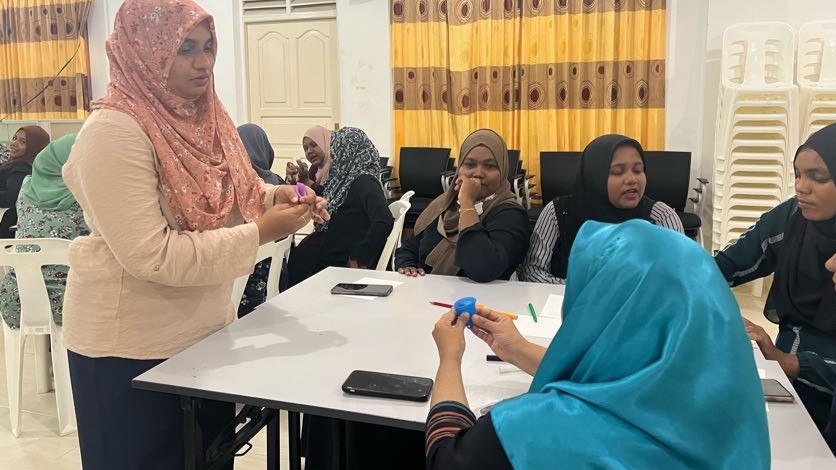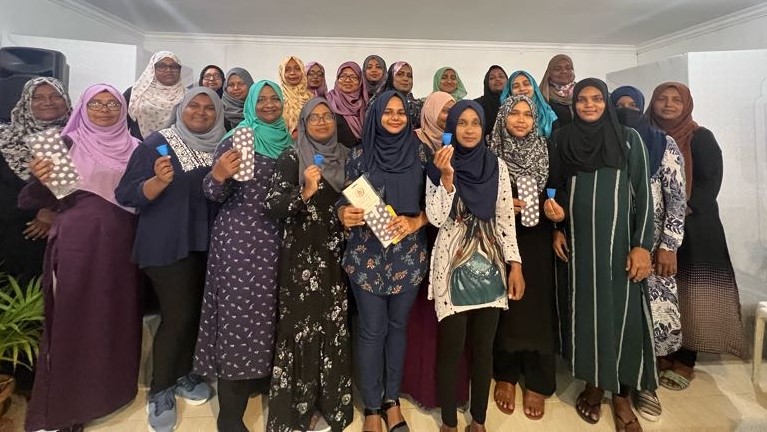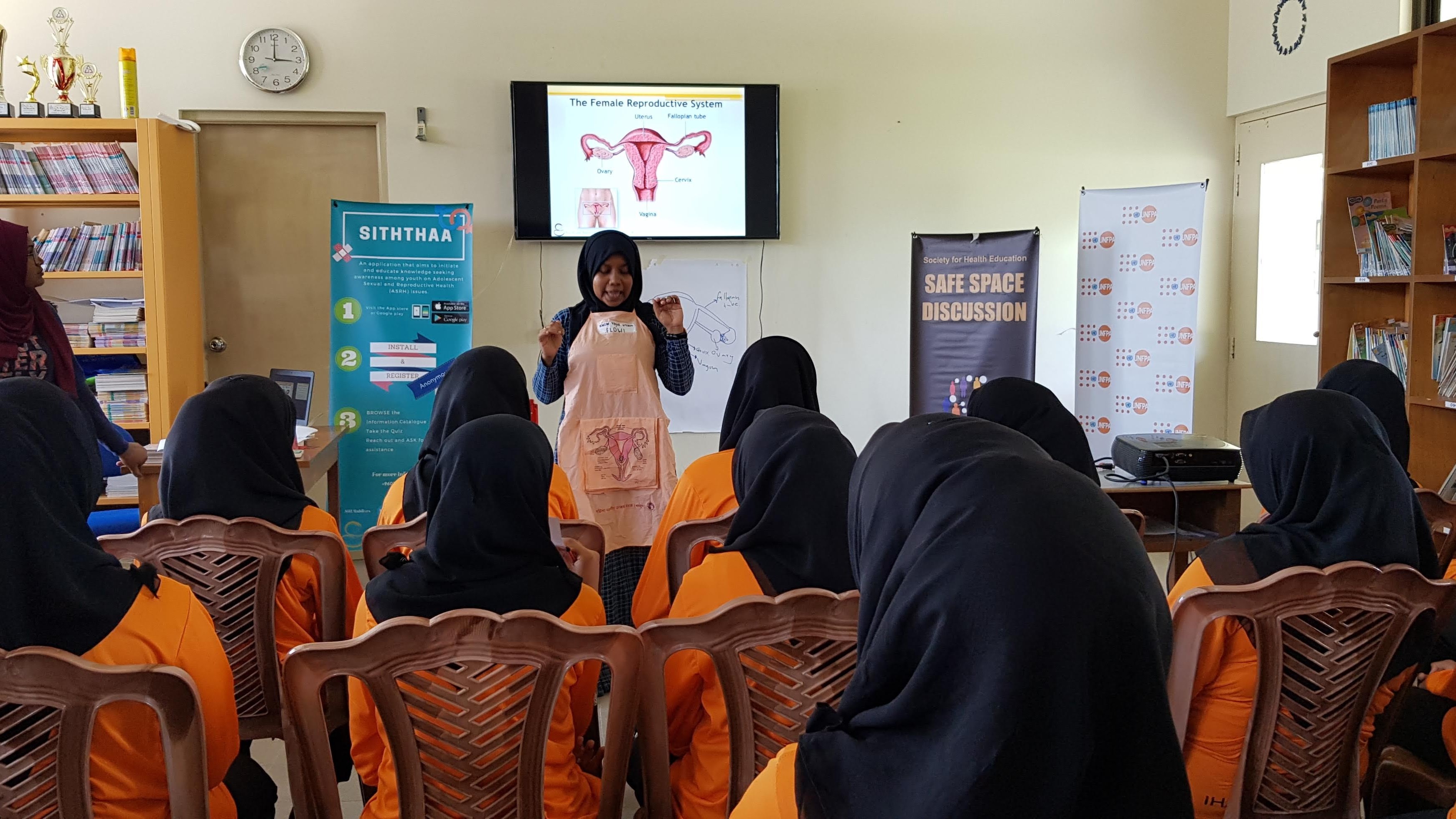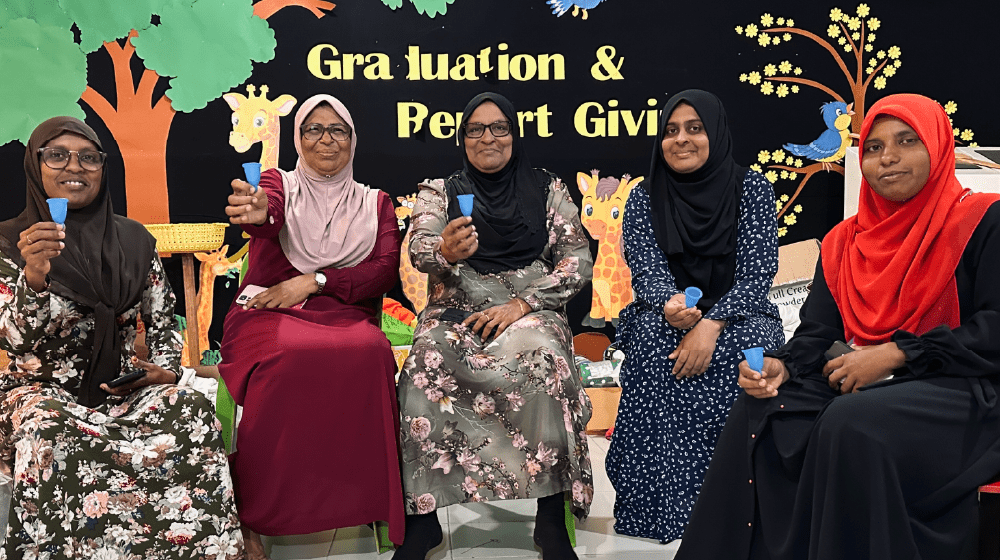Enmena Engey Bodu Sirru is a joint initiative of UNFPA Maldives, Soneva Namoona and Zero Waste Maldives, aiming to redefine the discourse around menstrual health and its environmental implications in the Maldives. In a society where menstrual health remains a taboo, this partnership brings it to the forefront, empowering women with the tools and knowledge to make choices that ripple outward, impacting both society and the environment.

© Soneva Namoona
The initiative’s distinctiveness lies not only in its objectives, but also in its multifaceted approach. While many programs in the past have struggled to link health initiatives with environmental concerns, this project achieves it effortlessly, providing an enlightening lens on how single-use plastics influence human health and planetary health.
And the results? They are already evident. Faraha, a participant from Dharavandhoo, shared her transformative journey, “Before I joined the session, I never thought about the environmental impact of disposable pads. Now, using the menstrual cup, I realize the wastage I was contributing to every month.” During the sessions conducted earlier this year, over 95 women and girls in the Maldives, including Faraha now find themselves equipped with invaluable knowledge about reproductive health and have access to sustainable menstrual products.
Faraha’s experience is a testament to the project’s success in achieving its aspirations: empowering women, fostering safe spaces for dialogue and growth, and illuminating the impact of single-use plastics in menstrual products. “I used to get really bad mood swings when I was using pads. They were itchy and caused a lot of discomfort. But after switching to cups, my cramps reduced and I hardly remember that I’m on my period most of the time.” This shift not only brought ease to her life, but also marked a significant step towards sustainable waste practices. Highlighting the cost-effectiveness of this change, Faraha noted, “Switching to the cup has been financially smarter too. With a cup that lasts up to 10 years, I save nearly MVR 5000 annually, which I used to spend on pads.”
The Enmena Engey Bodu Sirru sessions have been pivotal in introducing women like Faraha to alternatives they were previously unaware of. “I learnt a lot from these sessions, not just about menstrual products, but also about the female reproductive system. It was eye-opening to discover that you don’t need to remove the cup, even when you pee,” Faraha shared, expressing her newfound understanding and appreciation of her body. The project hopes for this awareness to inspire a shift towards sustainable waste practices, resonating with Faraha’s belief that “health-wise and environmentally, cups are the better choice.”

© Soneva Namoona
Before Enmena Engey Bodu Sirru, the CupVert program had also exemplified the tangible positive change in motion. Having reached over 700 girls and women, providing them with sustainable alternatives to disposable menstrual products, a ripple effect is in motion. Today, those who benefitted have turned advocates, vocalizing the transformative power of such interventions. The collaborative vision behind this initiative aims for a marked decrease in waste, targeting an avoidance of approximately 1.1 tons per year in the long run. More immediately, there is an ongoing effort to ensure the upcoming generation of women, together with their parents, gains an in-depth understanding of reproductive health, gravitating towards eco-friendly menstrual solutions.

© Zero Waste Maldives
So, what does the future of these ambitions look like? It’s a world where women and girls stand empowered, making decisions harmonized with both personal and planetary health. It’s a scenario where discussions about reproductive health are as mainstream as any other health conversation, and where the Maldives witness a significant downturn in the usage of disposable menstrual products.reflected in both its immediate outcomes and its long-term vision. It underscores the need to deconstruct traditional silos. It’s a call to design interventions with a holistic perspective, understanding the interconnected impact of individual choices on personal and planetary health. By transforming taboos into open dialogues and fostering sustainable practices, this initiative aims to inspire this conversation into a focal point in even major discussions such as climate change.
Follow the project on:



